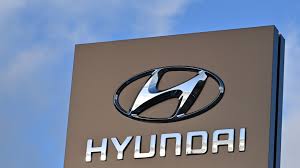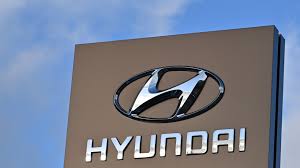
Hyundai Motor Co, the world's third-largest automaker, issued a warning on Thursday about slowing global demand and mounting competition in the automotive industry. Despite these concerns, the company remains committed to achieving its 2024 earnings target, even after reporting a 7% drop in third-quarter operating profit. This news led to a 5% decline in Hyundai's share price, reflecting investor concerns about the company's ability to navigate the increasingly challenging market conditions.
Industry Challenges: Slowing Demand and Rising Costs
Hyundai's Chief Financial Officer, Lee Seung-jo, highlighted several key factors contributing to the company's current struggles during a recent earnings call. He emphasized that "the business environment for the car industry is worsening," citing policy uncertainties and growing geopolitical risks as significant challenges for automakers worldwide. These external pressures are not unique to Hyundai, as major European car manufacturers like Volkswagen, Mercedes-Benz, and BMW have similarly flagged concerns about declining auto demand and rising operational costs.
The global automotive market has been hit hard by a slowdown in consumer demand, which has led to an increase in sales incentives and competitive pricing strategies across the industry. Hyundai's global retail sales fell by 5% in the third quarter of 2024 compared to the same period last year. The decline in European sales outweighed the growth seen in the United States and South Korea. Additionally, the company's third-quarter operating profit of 3.6 trillion won ($2.6 billion) fell short of market expectations, with analysts predicting 3.9 trillion won, according to data from LSEG SmartEstimate.
Impact of Warranty Costs and Incentives
Hyundai's third-quarter results were also affected by rising warranty costs and increased sales incentives, which cut into the company's profitability. One of the most significant contributors to these additional costs was a 320 billion won charge related to engine issues with its popular Santa Fe SUV in the United States. Hyundai has been facing challenges in maintaining vehicle quality in its global markets, particularly in the U.S., where stricter regulations and consumer expectations are forcing the company to improve its warranty programs.
The company has also had to boost sales incentives in response to declining consumer demand, further eating into its profit margins. Despite these pressures, Hyundai managed to achieve an operating margin of 8.9% for the first nine months of 2024, keeping it on track to meet its full-year target of 8% to 9%. This demonstrates the company’s focus on maintaining profitability, even as market conditions grow more complex.
Shift to Hybrid Vehicles Amid Electric Vehicle Slowdown
One of the most interesting developments in Hyundai’s strategy is its focus on hybrid vehicles. As global demand for electric vehicles (EVs) has slowed, Hyundai has pivoted towards hybrids, which offer higher profit margins than EVs. In the third quarter of 2024, Hyundai reported a more than 40% increase in hybrid EV sales compared to the same period last year. The company plans to double its hybrid vehicle lineup to capitalize on this growing segment, while simultaneously cutting back on its EV sales targets and delaying the launch of certain EV models.
This strategic shift comes at a time when many automakers are grappling with the challenges of scaling up electric vehicle production amid supply chain constraints, rising raw material costs, and evolving consumer preferences. Hyundai’s decision to expand its hybrid offerings reflects a pragmatic approach to balancing sustainability goals with profitability.
Hyundai's Plans for Expansion in India and the U.S.
In addition to its strategic pivot towards hybrids, Hyundai is focusing on expanding its presence in key international markets, including India and the United States. The company is set to boost its competitiveness in India through the public listing of its Indian unit, with proceeds from the initial public offering (IPO) being reinvested into the business. However, Hyundai Motor India’s shares fell by 7.2% on their market debut, as retail investors were cautious about the high valuation and concerns about a broader industry slowdown.
Meanwhile, in the United States, Hyundai's new factory in Georgia began production earlier this month. This facility will play a crucial role in Hyundai's future growth strategy, particularly in the electric vehicle market. The company noted that electric vehicles produced at the new plant will qualify for U.S. federal tax credits, providing a significant incentive for consumers and enhancing Hyundai's competitiveness in the North American market.
Hyundai's U.S. expansion also includes a non-binding deal with General Motors (GM) to explore future collaboration in areas such as vehicle development, supply chain management, and clean energy technologies. This potential partnership could provide Hyundai with new opportunities to innovate and strengthen its position in a rapidly evolving automotive landscape.
Outlook: Balancing Challenges with Strategic Shifts
Despite the challenges posed by slowing demand, rising costs, and geopolitical risks, Hyundai remains optimistic about achieving its 2024 profit targets. The company's focus on hybrid vehicles, combined with its expansion in key international markets, reflects a strategic approach to maintaining profitability in a turbulent market environment.
However, the road ahead will not be easy. Hyundai must continue to navigate the complexities of a global automotive market that is undergoing significant changes, from shifting consumer preferences to increasing regulatory pressures. As the company adapts to these challenges, its ability to balance short-term profitability with long-term growth will be critical to its future success.
Hyundai’s third-quarter performance highlights the broader difficulties facing the global automotive industry, but also showcases the company’s resilience and adaptability. By focusing on hybrid vehicles, expanding in key markets like India and the U.S., and exploring new partnerships, Hyundai is positioning itself to weather the current storm while preparing for future growth opportunities.
(Source:www.reuters.com)
Industry Challenges: Slowing Demand and Rising Costs
Hyundai's Chief Financial Officer, Lee Seung-jo, highlighted several key factors contributing to the company's current struggles during a recent earnings call. He emphasized that "the business environment for the car industry is worsening," citing policy uncertainties and growing geopolitical risks as significant challenges for automakers worldwide. These external pressures are not unique to Hyundai, as major European car manufacturers like Volkswagen, Mercedes-Benz, and BMW have similarly flagged concerns about declining auto demand and rising operational costs.
The global automotive market has been hit hard by a slowdown in consumer demand, which has led to an increase in sales incentives and competitive pricing strategies across the industry. Hyundai's global retail sales fell by 5% in the third quarter of 2024 compared to the same period last year. The decline in European sales outweighed the growth seen in the United States and South Korea. Additionally, the company's third-quarter operating profit of 3.6 trillion won ($2.6 billion) fell short of market expectations, with analysts predicting 3.9 trillion won, according to data from LSEG SmartEstimate.
Impact of Warranty Costs and Incentives
Hyundai's third-quarter results were also affected by rising warranty costs and increased sales incentives, which cut into the company's profitability. One of the most significant contributors to these additional costs was a 320 billion won charge related to engine issues with its popular Santa Fe SUV in the United States. Hyundai has been facing challenges in maintaining vehicle quality in its global markets, particularly in the U.S., where stricter regulations and consumer expectations are forcing the company to improve its warranty programs.
The company has also had to boost sales incentives in response to declining consumer demand, further eating into its profit margins. Despite these pressures, Hyundai managed to achieve an operating margin of 8.9% for the first nine months of 2024, keeping it on track to meet its full-year target of 8% to 9%. This demonstrates the company’s focus on maintaining profitability, even as market conditions grow more complex.
Shift to Hybrid Vehicles Amid Electric Vehicle Slowdown
One of the most interesting developments in Hyundai’s strategy is its focus on hybrid vehicles. As global demand for electric vehicles (EVs) has slowed, Hyundai has pivoted towards hybrids, which offer higher profit margins than EVs. In the third quarter of 2024, Hyundai reported a more than 40% increase in hybrid EV sales compared to the same period last year. The company plans to double its hybrid vehicle lineup to capitalize on this growing segment, while simultaneously cutting back on its EV sales targets and delaying the launch of certain EV models.
This strategic shift comes at a time when many automakers are grappling with the challenges of scaling up electric vehicle production amid supply chain constraints, rising raw material costs, and evolving consumer preferences. Hyundai’s decision to expand its hybrid offerings reflects a pragmatic approach to balancing sustainability goals with profitability.
Hyundai's Plans for Expansion in India and the U.S.
In addition to its strategic pivot towards hybrids, Hyundai is focusing on expanding its presence in key international markets, including India and the United States. The company is set to boost its competitiveness in India through the public listing of its Indian unit, with proceeds from the initial public offering (IPO) being reinvested into the business. However, Hyundai Motor India’s shares fell by 7.2% on their market debut, as retail investors were cautious about the high valuation and concerns about a broader industry slowdown.
Meanwhile, in the United States, Hyundai's new factory in Georgia began production earlier this month. This facility will play a crucial role in Hyundai's future growth strategy, particularly in the electric vehicle market. The company noted that electric vehicles produced at the new plant will qualify for U.S. federal tax credits, providing a significant incentive for consumers and enhancing Hyundai's competitiveness in the North American market.
Hyundai's U.S. expansion also includes a non-binding deal with General Motors (GM) to explore future collaboration in areas such as vehicle development, supply chain management, and clean energy technologies. This potential partnership could provide Hyundai with new opportunities to innovate and strengthen its position in a rapidly evolving automotive landscape.
Outlook: Balancing Challenges with Strategic Shifts
Despite the challenges posed by slowing demand, rising costs, and geopolitical risks, Hyundai remains optimistic about achieving its 2024 profit targets. The company's focus on hybrid vehicles, combined with its expansion in key international markets, reflects a strategic approach to maintaining profitability in a turbulent market environment.
However, the road ahead will not be easy. Hyundai must continue to navigate the complexities of a global automotive market that is undergoing significant changes, from shifting consumer preferences to increasing regulatory pressures. As the company adapts to these challenges, its ability to balance short-term profitability with long-term growth will be critical to its future success.
Hyundai’s third-quarter performance highlights the broader difficulties facing the global automotive industry, but also showcases the company’s resilience and adaptability. By focusing on hybrid vehicles, expanding in key markets like India and the U.S., and exploring new partnerships, Hyundai is positioning itself to weather the current storm while preparing for future growth opportunities.
(Source:www.reuters.com)














